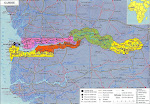I finally gave in and presented a workshop on Jolly Phonics. From my observations, I saw that the children know the songs, but there is NO connection between knowing the sounds of letters and blending them into words. Never have I heard a child try to sound out a word. Never are they asked to. Never have I seen it practiced in any way. Thus, the workshop. I was really pleased with the reaction of the teachers, from asking for help ahead of time to talking more and more about their teaching after. It's going to be a tough and tedious process for the teachers to turn the children into readers rather than rote responders. Most seem up for the task although I'm not sure how much they understand yet.
MondoChallenge had provided training for some teachers and a volunteer had provided many supplies (perhaps with MondoChallenge's help). Unfortunately, only one of the trained teachers remains at the school. And most of the supplies went along with the transferred teachers. Thus, we're starting near zero in many ways. There are a few supplies that I must have and will pay for myself unless MondoChallenge or my friends assist. Every teacher must have a copy of the songs and a copy of a small book of word banks. The latter is being printed this weekend. Fifty pages at two dalasi per page for fifteen teachers. That's only 750 dalasi, so I said go ahead. The songs I'll do soon although I've hand written two copies already.
The other item which is desperately needed is the little composition books the children use. Their parents are supposed to buy them, but often can't or don't. Thus the children sit with nothing to do. The cost is only five for a dollar. I'd love to be able to pass them out to those I see are in need or the teachers say are in need. Many supplies sit in the office (not composition books) and are not offered to teachers or students. Thus, I want control. If anyone wants to contribute, just let Ken know and he'll make deposits to our account. Next weekend I may be able to get to an ATM. So far, I haven't been to Banjul where the country's three ATMs are located!!!!
That's all for now. Thinking about you all, and enjoying the challenges life brings.
Friday, February 6, 2009
Music to come
It's hard to believe that I've been here three weeks and have heard NO drumming. The wedding we attended last Sunday was to have it, but it turned out that there had been a funeral in the family during the week, so the music was cancelled.
Tomorrow will be my first real kora lesson with PaBobo. Then in the evening I'll be hearing his group perform. Maybe you'll see a video of it next week or after Ken gets ahold of it.
There really isn't any music in the village where I live. Can't believe it.
The internet is being really weird and I just lost a whole post about how they deal with trash. This is just a warning that there may be no more this weekend. Sorry.
Tomorrow will be my first real kora lesson with PaBobo. Then in the evening I'll be hearing his group perform. Maybe you'll see a video of it next week or after Ken gets ahold of it.
There really isn't any music in the village where I live. Can't believe it.
The internet is being really weird and I just lost a whole post about how they deal with trash. This is just a warning that there may be no more this weekend. Sorry.
Sunday, February 1, 2009
An idea of the School
I've spent the last week observing the teaching at the Makumbaya Lower Basic School. I'm amazed. Most teachers are terribly dedicated, but half untrained. The class sizes are outrageous; from 33 to 47. Last year half the class came in the morning and half in the afternoon, but the government said that unless there are more than SIXTY students in the class, that would not be allowed!!!! Can you imagin 45 first graders? How in the world can you teach that many students the basic of reading and math. My job is to come up with techniques. If any of you want to suggest one, please do.
The children come to school at 9 and at 11:30 have a half hour break where mothers sell food. Most children have a couple dalasis to purchase. I pity those that don't, but can't help them. At noon they go back in for another hour instruction. Then there are a few third and fifth grade students whose parents can pay 15 dalasis a month for further instruction from two to four.
There is also an advanced placement class for the best of the sixth grad and they're testing now for the fifth grade class. On Friday I began the folktale to drama road with the sixth by reading Anansi and the Tug-of-War.
Twice a week the students begin their day by standing in line for A HALF HOUR for assembly. THat's the time the deputy tells them about being on time and studying hard. It's incredibly boring and of course as far as being on time he's "preaching to the choir" since the late comers aren't their yet. I just can't imagine US students successfully doing that!
Corporal punishment is legally not allowed, but it happens anyhow. I don't condone it, but how can untrained individuals, or even trained teachers handle so many students for such long times without having a bit of fear instilled in them . It's part of their life and it surprises me that the children are still enthusiastic about learning. They still volunteer to go to the board even though if what they write in incorrect, instead of being aided to succeed, they'll be told, "Wrong! Take your seat. Don't waste our time!" (I've heard those words in at least six classrooms!) I'm hoping to instill in the teachers the idea of "positive reinforcement" by the time I leave.
As I was told, there are few supplies other than chalk and a piece of sponge to erase and a book for the teacher. When there are student texts, there are only a few. I observed a reading lesson in a fifth grade of 45 students who had nine texts. THey did group so five were sharing each book, but two were trying to read up-side down. Then there was the first grade with 45 students and nine books where the teacher gave a book to 9 individual students and the others didn't even have a chance to see. This truly is an emense challenge.
Well, on the positive side, so far, suggestions seem to be appreciated and several teachers have used them. Hope it lasts.
Many more things to tell, but time is running out. Loving life here, challange after challange.
The children come to school at 9 and at 11:30 have a half hour break where mothers sell food. Most children have a couple dalasis to purchase. I pity those that don't, but can't help them. At noon they go back in for another hour instruction. Then there are a few third and fifth grade students whose parents can pay 15 dalasis a month for further instruction from two to four.
There is also an advanced placement class for the best of the sixth grad and they're testing now for the fifth grade class. On Friday I began the folktale to drama road with the sixth by reading Anansi and the Tug-of-War.
Twice a week the students begin their day by standing in line for A HALF HOUR for assembly. THat's the time the deputy tells them about being on time and studying hard. It's incredibly boring and of course as far as being on time he's "preaching to the choir" since the late comers aren't their yet. I just can't imagine US students successfully doing that!
Corporal punishment is legally not allowed, but it happens anyhow. I don't condone it, but how can untrained individuals, or even trained teachers handle so many students for such long times without having a bit of fear instilled in them . It's part of their life and it surprises me that the children are still enthusiastic about learning. They still volunteer to go to the board even though if what they write in incorrect, instead of being aided to succeed, they'll be told, "Wrong! Take your seat. Don't waste our time!" (I've heard those words in at least six classrooms!) I'm hoping to instill in the teachers the idea of "positive reinforcement" by the time I leave.
As I was told, there are few supplies other than chalk and a piece of sponge to erase and a book for the teacher. When there are student texts, there are only a few. I observed a reading lesson in a fifth grade of 45 students who had nine texts. THey did group so five were sharing each book, but two were trying to read up-side down. Then there was the first grade with 45 students and nine books where the teacher gave a book to 9 individual students and the others didn't even have a chance to see. This truly is an emense challenge.
Well, on the positive side, so far, suggestions seem to be appreciated and several teachers have used them. Hope it lasts.
Many more things to tell, but time is running out. Loving life here, challange after challange.
Subscribe to:
Posts (Atom)






